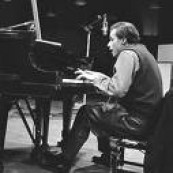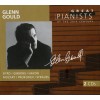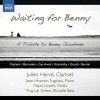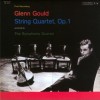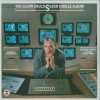Composers
Glenn Gould was born in Toronto on September 25, 1932, to Russell Herbert ("Bert") Gould and Florence ("Flora") Emma Greig Gould, Presbyterians of Scottish extraction. (Greig is the original Scottish spelling of this name, unlike the Norwegian variant Grieg.) His mother's grandfather was a cousin of Norwegian composer Edvard Grieg. Though not athletic, Gould was a sociable young man. He was close friends throughout his life with his cousin, Jessie Greig.
Gould\'s interest in music, and his talent as a pianist, became evident very early on. Both his parents were musical and his mother, especially, encouraged the infant Gould\'s early musical development. He had perfect pitch and could read music before he could read words. At a young age, he reportedly behaved differently from typical children at the piano: he would strike single notes and listen to their long decay.Gould's first piano teacher was his mother until the age of ten. At ten he began attending the Royal Conservatory of Music in Toronto, where he studied piano with Alberto Guerrero, organ with Frederick C. Silvester and theory with Leo Smith.
At an early age Gould became interested in composition, and played his own little pieces for family, friends, and sometimes larger gatherings. For example in 1938, in the company of his mother, Gould attended the Emmanuel Presbyterian Church, a few blocks from the Gould house, and performed one of his own compositions.
When he was six, Glenn was taken for the first time to hear a live musical performance by a celebrated soloist, which had a tremendous impact on him. He later described the experience:
"It was Hofmann. It was, I think, his last performance in Toronto, and it was a staggering impression. The only thing I can really remember is that, when I was being brought home in a car, I was in that wonderful state of through your mind. They were all orchestral sounds, but I was playing them all, and suddenly I was Hofmann. I was enchanted."
In 1945, he gave his first public performance, playing the organ, and the following year he made his first appearance with an orchestra, the Toronto Symphony Orchestra, in a performance of Beethoven's 4th piano concerto. His first public recital followed in 1947, and his first recital on radio came with the CBC in 1950. This was the beginning of his long association with radio and recording.
In 1957, Gould toured the Soviet Union, becoming the first North American to play there since World War II. His concerts featured Bach, Beethoven, and the serial music of Arnold Schoenberg and Alban Berg, which had been suppressed in the Soviet Union during the era of Socialist Realism.
On April 10, 1964, Gould gave his last public performance, playing in Los Angeles, California, at the Wilshire Ebell Theater. Among the pieces he performed that night were Beethoven\'s Piano Sonata No. 30, selections from Bach\'s The Art of Fugue, and the Piano Sonata No. 3, Op. 92 No. 4 by Ernst Krenek. Oddly, a recording exists in which Gould claims the event took place in Chicago. For the rest of his life he eschewed live performance, focusing instead on recording, writing, and broadcasting. Towards the end of his life he began conducting; he had earlier directed Bach\'s Brandenburg concerto no.5 and cantata BWV 54, Widerstehe doch der Sünde from the harpsipiano (a piano with metal hammers to simulate harpsichord sound) in the 1960s. His last recording was as a conductor, Wagner's Siegfried Idyll in its original chamber music scoring. He had intended to give up the piano at the age of 50, spending later years conducting, writing on music and perhaps composing.
During his life he suffered many pains and ailments, including chronic prostatitis.
He suffered a stroke on 27 September 1982, which paralyzed the left side of his body. He was admitted to hospital and his condition rapidly deteriorated. He was taken off life support on October 4. He is buried in Toronto's Mount Pleasant Cemetery.
Recently Added
Biography
Glenn Gould was born in Toronto on September 25, 1932, to Russell Herbert ("Bert") Gould and Florence ("Flora") Emma Greig Gould, Presbyterians of Scottish extraction. (Greig is the original Scottish spelling of this name, unlike the Norwegian variant Grieg.) His mother's grandfather was a cousin of Norwegian composer Edvard Grieg. Though not athletic, Gould was a sociable young man. He was close friends throughout his life with his cousin, Jessie Greig.
Gould\'s interest in music, and his talent as a pianist, became evident very early on. Both his parents were musical and his mother, especially, encouraged the infant Gould\'s early musical development. He had perfect pitch and could read music before he could read words. At a young age, he reportedly behaved differently from typical children at the piano: he would strike single notes and listen to their long decay.Gould's first piano teacher was his mother until the age of ten. At ten he began attending the Royal Conservatory of Music in Toronto, where he studied piano with Alberto Guerrero, organ with Frederick C. Silvester and theory with Leo Smith.
At an early age Gould became interested in composition, and played his own little pieces for family, friends, and sometimes larger gatherings. For example in 1938, in the company of his mother, Gould attended the Emmanuel Presbyterian Church, a few blocks from the Gould house, and performed one of his own compositions.
When he was six, Glenn was taken for the first time to hear a live musical performance by a celebrated soloist, which had a tremendous impact on him. He later described the experience:
"It was Hofmann. It was, I think, his last performance in Toronto, and it was a staggering impression. The only thing I can really remember is that, when I was being brought home in a car, I was in that wonderful state of through your mind. They were all orchestral sounds, but I was playing them all, and suddenly I was Hofmann. I was enchanted."
In 1945, he gave his first public performance, playing the organ, and the following year he made his first appearance with an orchestra, the Toronto Symphony Orchestra, in a performance of Beethoven's 4th piano concerto. His first public recital followed in 1947, and his first recital on radio came with the CBC in 1950. This was the beginning of his long association with radio and recording.
In 1957, Gould toured the Soviet Union, becoming the first North American to play there since World War II. His concerts featured Bach, Beethoven, and the serial music of Arnold Schoenberg and Alban Berg, which had been suppressed in the Soviet Union during the era of Socialist Realism.
On April 10, 1964, Gould gave his last public performance, playing in Los Angeles, California, at the Wilshire Ebell Theater. Among the pieces he performed that night were Beethoven\'s Piano Sonata No. 30, selections from Bach\'s The Art of Fugue, and the Piano Sonata No. 3, Op. 92 No. 4 by Ernst Krenek. Oddly, a recording exists in which Gould claims the event took place in Chicago. For the rest of his life he eschewed live performance, focusing instead on recording, writing, and broadcasting. Towards the end of his life he began conducting; he had earlier directed Bach\'s Brandenburg concerto no.5 and cantata BWV 54, Widerstehe doch der Sünde from the harpsipiano (a piano with metal hammers to simulate harpsichord sound) in the 1960s. His last recording was as a conductor, Wagner's Siegfried Idyll in its original chamber music scoring. He had intended to give up the piano at the age of 50, spending later years conducting, writing on music and perhaps composing.
During his life he suffered many pains and ailments, including chronic prostatitis.
He suffered a stroke on 27 September 1982, which paralyzed the left side of his body. He was admitted to hospital and his condition rapidly deteriorated. He was taken off life support on October 4. He is buried in Toronto's Mount Pleasant Cemetery.
